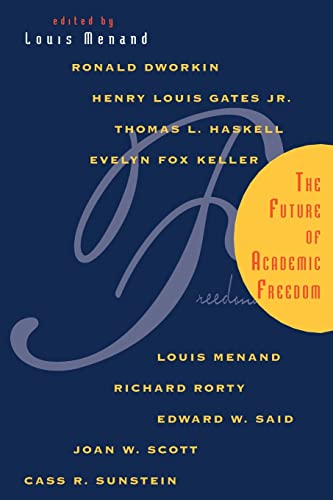Menand Louis Richard Dworkin Henry (1 results)
Product Type
- All Product Types
- Books (1)
- Magazines & Periodicals
- Comics
- Sheet Music
- Art, Prints & Posters
- Photographs
- Maps
-
Manuscripts &
Paper Collectibles
Condition
- All Conditions
- New
- Used
Binding
- All Bindings
- Hardcover
- Softcover
Collectible Attributes
- First Edition
- Signed
- Dust Jacket
- Seller-Supplied Images
- Not Printed On Demand
Seller Location
Seller Rating
-
The Future of Academic Freedom
Published by The University of Chicago Press, Chicago and London, 1996
ISBN 10: 0226520056ISBN 13: 9780226520056
Seller: About Books, Henderson, NV, U.S.A.
Book First Edition
Paperback. Condition: Original printed wraps. First Paperback Edition. Chicago and London: The University of Chicago Press, 1996. 6" wide by 9" tall. As New condition. No store stamp, owner's name or bookplate. No remainder marks. No underlining. No highlighting. No margin notes. Bright, shiny, clean, square, tight, unmarked copy. Flat spine. No creases. Pages are fresh and crisp, obviously never read. From the publisher: "At the bottom of every controversy embroiling the university today -- from debates over hate-speech codes to the reorganization of the academy as a multicultural institution -- is the concept of academic freedom. But academic freedom is almost never mentioned in these debates. Now nine leading academics consider the problems confronting the American university in terms of their effect on the future of academic freedom. Whom and what does academic freedom protect? Are restrictions on hate speech compatible with the academic freedom of inquiry? Must academic freedom have epistemological foundations, or should it be reconceived as an ethical practice? If the American university is now undergoing a radical reorganization, both intellectual and economic, what are the threats to the freedoms of inquiry and expression that professors and students have traditionally taken for granted? The essays respond to critics of the university, but they also respond to one another: Rorty and Haskell argue about the epistemological foundations of academic freedom; Gates and Sunstein discuss the legal and educational logic of speech codes. But in the end the volume achieves an unexpected consensus about the need to reconceive the concept of academic freedom in order to meet the threats and risks of the future.". First Paperback Edition. Soft Cover. Original printed wraps. ix, 239pp.


